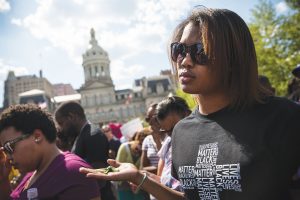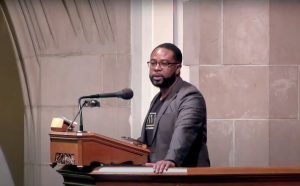
Dr. Jemar Tisby stepped up to the lectern in Grove City College’s Harbison Chapel for what was to be a 20-minute talk. Students, required to attend these services, weren’t altogether thrilled to be there. I was watching an online recording of the event after the fact, but if the atmosphere on October 20, 2020, was anything like when I earlier attended “The Grove,” many students would have been nodding off, texting or trying to finish homework without being caught.
In his signature look, a blazer over a topical graphic T-shirt, Tisby took off his black mask emblazoned with the word “VOTE” in huge white letters and began speaking.
He began his lecture by reading Esther 4:12-14 (NIV): “When Esther’s words were reported to Mordecai, he sent back this answer: ‘Do not think that because you are in the king’s house you alone of all the Jews will escape. For if you remain silent at this time, relief and deliverance for the Jews will arise from another place, but you and your father’s family will perish. And who knows but that you have come to your royal position for such a time as this?’”
Tisby then quoted a passage from Rev. Martin Luther King Jr.’s “I Have a Dream” speech, but he didn’t read the most familiar section. Instead, the Black Christian historian and professor drew the attention of the almost entirely white student body and faculty to a more radical paragraph: “We have also come to this hallowed spot to remind America of the fierce urgency of now. This is no time to engage in the luxury of cooling off or to take the tranquilizing drug of gradualism. Now is the time to make real the promises of democracy.”

Next, he turned to a line he had earlier shared on social media: “In case you weren’t sure, this is the Civil Rights Movement of our time. It is happening right now. How you are responding in this moment is exactly how you would have responded during the movement of the 1950s and ‘60s.”
He made the connection explicit: “In the Bible, I think they would have called ‘the fierce urgency of now,’ ‘such a time as this.’”
Citing recent murders of Black people and specifically naming ongoing anti-Black police brutality, Tisby asked students what they would do in such a time as this. Before his white conservative audience, he quoted King’s dismay of “the white moderate” who is “more devoted to order than to justice.” He told them that they are who King would have called white moderates. He called on them directly to leave their comfort zones and take action.
They didn’t like that.
In particular, the school’s Board of Trustees didn’t like it.
Years later, when a Special Committee appointed by the Grove City College Board of Trustees released a report criticizing “mission drift” brought about by “creeping ‘wokeness’” and “critical race theory,” they cited Tisby’s chapel presentation and its “divisive racial themes.” Most of the Grove City leadership, they stated, agreed that “in hindsight, inviting Mr. Tisby to speak in chapel was a mistake.”
Tisby’s 2020 experience at my alma mater came to mind when, while I was recently interviewing him, he identified himself as an “evangelical reject.” He had come to the Christian faith in white evangelical spaces. He was a true believer, not just in the religion itself, but in racial reconciliation within the church. Yet the more time he dedicated to preaching, speaking and writing about it, the more he realized that when many white evangelicals spoke of racial reconciliation, they did not mean what he thought they meant.
He discovered that what many white evangelicals called racial reconciliation was instead the most basic form of diversity: what he now calls “hues in the pews.” The white church gets the optics it wants without having to do the real work of reckoning with the church’s or the nation’s racist past or present. When someone holds their feet to the fire and demands accountability — perhaps even explicitly calling white moderates the stumbling blocks to justice — they refuse.
Fortunately, Tisby is not one to disappear quietly into the night. Confronted with his church’s refusal to attempt racial reconciliation, he created his own career of teaching people about the history of racial injustice in the United States and in the evangelical church. Now the author of three books on Black history and resistance in the church, he also hosts a podcast, writes for major news outlets and speaks at venues nationwide — including as a keynote speaker for AU’s upcoming 2025 Summit for Religious Freedom, of which he told me:
“What I firmly believe, and what we’ve seen in justice movements in the past, is it takes coalitions and alliances to strategically partner in pursuit of a common goal. I’m a very religious person. I’m public about that. And yet I find common cause with this event and [Americans United], because we see the same dangers in White Christian Nationalism and in this toxic melding of faith and politics.
“And so I see a lot of intersections in our work. I’m eager to share, from a faith perspective, why the separation of church and state is vital not only to our nation, but the church.”
At my prompting, Tisby shared a few hints about his upcoming keynote speech. He will discuss how white Christian Nationalism and a belief in the marriage of church and state are as old as the U.S. itself. White Christian Nationalism has existed as long as whiteness and has always been dangerously racist. At the same time, Christians have long strived for a more inclusive democracy and a more inclusive faith.
He continued:
“I always try to call it White Christian Nationalism, because we tend to downplay the racial elements of White Christian Nationalism. And that’s a very historic U.S. thing, of trying to make the race part disappear. I’m firmly convinced that you cannot understand White Christian Nationalism without understanding its racial messages.
“It’s especially important that we call it White Christian Nationalism now, because we see so many Black and Brown faces [embracing some of the ideology’s tenets]. So then these folks become useful props for plausible deniability of racism. But in reality, they’re reinforcing racism, and their very presence there is reinforcing it. So we’re not going to be fooled by it. You almost have to press it on people because in the United States, a lot of folks get so squeamish and squirmy when you talk about race, because it’s such an icky history. And guess what? It’s an icky present.”
Pairing the findings of a 2023 PRRI/Brookings study revealing that about 30% of both Black and white Christians generally accept Christian Nationalist beliefs with a 2021 Pew Research study indicating that 97% of Black Americans believe in God, Tisby explained that it’s not surprising that the language of “God and country” often resonates with Black Americans. Even so, he insisted that Black Christian patriotism must not be confused with white Christian Nationalism. The latter “tends toward a rigid, narrow, authoritarian kind of politics,” while “Black Christian patriotism tends toward an expansive, flexible, inclusive kind of politics,” he continued.
Never having heard anyone else put it that way, I asked Tisby to elaborate on what he means by Black Christian patriotism. He explained it as a belief in making one’s home or country better, a commitment to progress and democracy even when America has a long way to go to get there.
A love of country is not necessarily nationalist or even unhealthy. But as an oppressed group, Tisby noted, Black people may have interpreted the PRRI/Brookings survey questions differently than their privileged white counterparts. White Christian Nationalists embrace a framework of Christian supremacy that pushes out Muslims, Sikhs, atheists and others. Conversly, a Black view of Christianity is more likely to mean loving one’s neighbor and treating people equally. Survey statements like “Being Christian is an important part of being truly American” and “U.S. laws should be based on Christian values” were thus filtered through divergent worldviews.

Regardless, in Tisby’s telling, Christian Nationalism is fundamentally white, “an ethno-cultural ideology that uses Christian symbolism to create a permission structure for the acquisition of political power and social control.” When pressed to say more about ethno-cultural ideology, he insisted “We can never forget the White part of White Christian Nationalism — that their entire project is undergirded by this idea of a racial hierarchy in which people coded as White are at the apex.”
As for the Christian symbolism, Tisby perceives there “are people who pray, who read the Bible, who go to church. Yet what they do is very much not like Jesus.” Hiding their hate behind a veneer of faith gives them a permission structure — a “divine stamp of approval” — for their quest for political power and social control. It gives them a cover when they seek to ban abortion, deport immigrants and restrict voting rights.
I’ll be honest: at this point in the interview I was not feeling too positive. White Christian Nationalists use their faith, real or not, as a (literal) get-out-of-jail-free card. Even Tisby doesn’t see an end in sight for the exploding growth of their movement, emboldened by the power they failed to seize on Jan. 6th, 2021, but that they gained in November 2024.
What will stop them? What do we do?
Well, we know what we shouldn’t do, Tisby declared, relating something much like what he instructed those Grove City students four years ago: “Silence is complicity. I need people to understand that not taking action and avoiding confrontation supports the status quo. The only way we make progress in the world, and this nation in particular, is through constructive confrontation and struggle. And I still find a lot of people who want to believe the right things but haven’t yet taken much action to support those things.”
We remain in what the biblical Mordecai called “such a time as this,” Tisby continued, perhaps even more so than we were in October 2020. But there is hope:
“We can use a framework I developed in my book How to Fight Racism, called the ARC of Racial Justice. ARC is an acronym that stands for Awareness, Relationships, Commitment. They’re like three legs of a stool. You need all three to have a stable foundation to build your racial justice efforts on.
“Awareness means getting woke, learning the information, the history, the data, the facts. Because that awareness creates empathy and a burden for change.
“Second, progressives need to remember that change often comes through relationships. You want a policy to change? Guess what? At some point you’re going to have to talk to someone and communicate effectively enough that they are persuaded or pressured to change.
“This always gets into the last part, which is: What about the structural issues? Well, that’s the commitment, by which I don’t just mean staying the course. I mean committing to systemic and institutional change that affects more than one person, more than one relationship at a time. I mean change that affects entire systems and communities. So with each of those — Awareness, Relationships, Commitment — we can come up with discrete, actionable steps.”
All three of these steps begin in your — yes, your — local community. Go to that meeting. Sign up for that mailing list. Have a conversation. Tisby assures us that “a momentum will start to develop, and you don’t have to have all the steps mapped out. You need the desire and you need the courage and you need to take the next step. And that’s it.”
I encourage you to take the step of registering for AU’s upcoming Summit for Religious Freedom, to be held April 5-7 and featuring Jemar Tisby. Go to thesrf.org/news to register and read upcoming announcements about plenaries, breakout sessions and more. See you in April!